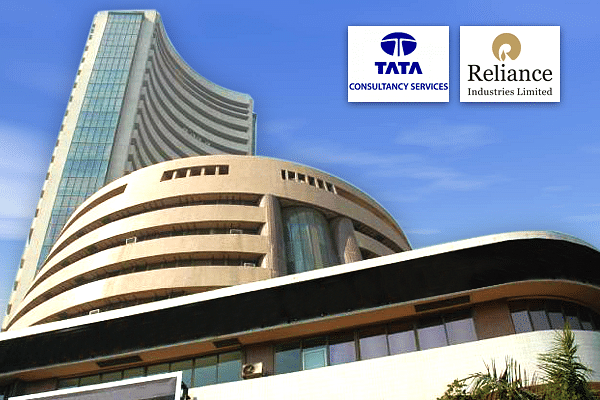
TCS Or Reliance? Race To Enter $100 Billion Market-Cap Club Tightens And Maybe Just Days – Or Hours – Away
To hit $100 billion market capitalisation at current exchange rates, TCS needs less than Rs 90 in terms of share price increase and for Reliance it is just around Rs 35.
Will it be the Tatas or Reliance? With the BSE Sensex and the NSE Nifty on a tear in a burst of “irrational exuberance” during the countdown to the Budget 2018-19, two companies – Reliance Industries and Tata Consultancy Services (TCS) – are closing in on an important milestone: the $100 billion market capitalisation club.
At the current rupee-dollar exchange rates of under Rs 64 (it was hovering at Rs 63.64 at the time of writing in the mid-morning of 24 January), a billion dollars translates to Rs 6,364 crore. To reach $100 billion in terms of stock market valuations, the company which touches Rs 636,400 crore first will enter the big club. (Of course, variations in the exchange rate can make that sooner or later).
Around the same time that the US dollar-rupee rate was quoting at Rs 63.64, TCS’s market capitalisation was just above Rs 619,000 crore while Reliance’s was at Rs 614,000 crore, with the valuations changing every few seconds with every trade. The prices quoted were Rs 3,241 for TCS and Rs 970 for Reliance (or thereabouts).
This shows that TCS is just a nose ahead of Reliance, but the race is still wide open.
While the race to the $100 billion club has been speeded up with the rapid rise in both the Sensex and the Nifty, with the Sensex scaling 36,000 in just four sessions, and the Nifty crossing 11,000, the underlying path of the two giants is interesting – and similar in one aspect.
Both companies are in the throes of transformation, from commodity or commoditised businesses to higher technology and more consumer-facing areas.
In the case of TCS, it is trying to make the leap from being a purely “labour arbitrage-driven” software services company to one which is foraying into enterprise consulting and transformation, and newer tech areas summed up in the acronym SMAC – social, mobile, analytics and cloud computing. It is the cash flow from the legacy labour arbitrage that is enabling this transformation.
In the case of Reliance Industries, the Ambanis are transforming the company from being a pure commodity player in oil, refining and petrochemicals to more strongly consumer facing businesses like telecom and retail, both of which seem to be moving sharply into positive margins territories. The money for this transformation – with the big investment obviously going into Reliance Jio – came from the cash cows of refining and petrochemicals, which are gushing cash just at the right time for expanding investments in the new businesses.
To realise how close both companies are to the $100 billion mark at current exchange rates, here is the change required. In the case of TCS, it needs less than Rs 90 in terms of share price increase, and for Reliance it is just around Rs 35.